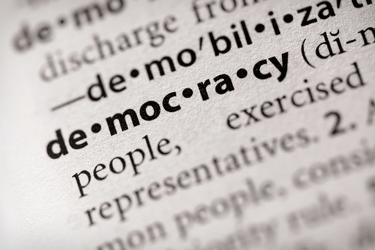by CHARLES C. W. COOKE
‘Put not your trust in princes,” warns the King James Bible, “nor in the son of man, in whom there is no help.”
This injunction is religious, not political, in nature. And yet its presumptions form the backbone of the American secular order, too. In assembling the U.S. Constitution, the Founding generation tried to record for posterity that neither liberty nor salvation can be wrung from the charming benevolence of a king. “Experience,” Thomas Jefferson wrote in 1778, “hath shewn, that even under the best forms of government those entrusted with power have, in time, and by slow operations, perverted it into tyranny.”
To avoid this fate, he concluded, an effort must be made to “illuminate, as far as practicable, the minds of the people at large.” Such an illumination, if achieved in concert with the imposition of hard limits on those who wielded power, would go a long way toward securing the integrity of the republic. Ostensibly, the remaining members of the Republican presidential field all agree on this principle. Repeatedly, we hear it asserted that Washington, D.C., is a corrupt, incestuous sort of place in which cronyism and collusion are the norm, and that this must be fixed if the future is to be won. Even Donald Trump, that cynical pretender and mocker of men, has made this case effectively. There is, Trump contends, a vast chasm between the American people and the “establishment” — a chasm that will narrow if he is elected. That Trump himself has spent the majority of his life buying and selling politicians should, he says, be taken less as evidence of his hypocrisy or opportunism and more as confirmation of the problem’s scale. What America needs, he says, is a leader who is for the “people,” not for the “elites.”
That we are witnessing a broad-based backlash against what Ted Cruz memorably calls the “Washington Cartel” — and, indeed, that even cultural figures such as Donald Trump can be heard advancing the case — is not a bad thing per se. But one has to be careful not to fall into a trap here, for, although there is broad agreement as to the nature of the problem, there is significant disagreement as to how it should be solved.
The conservative critique of the status quo is (1) that the federal government is too big and too intrusive; (2) that governments that are too big and too intrusive are quickly captured by special interests who do not promote the general good; and (3) that that this can be mitigated by limiting the size and scope of the government so that those who would use it to their advantage have fewer incentives to do so. Wisely, Donald Trump has signed on to part (1) and part (2) of this diagnosis. But then, alarmingly, he has stopped. Certainly, Trump can be heard proposing that the government has been taken over by “elites” and by rent-seekers; and yet, having done so, he does not go on to suggest reform as the remedy so much as to suggest himself. To hear Trump tell it, he will save the country by striking better “deals,” by refusing to be bought, and by channeling, in neo-Wilsonian fashion, what he perceives to be the will of the people. Or, put another way, Trump will solve the problem by playing the man on the white horse.
Whatever one’s view of Trump as a man, this should concern anybody who hopes to restore the blessings of limited government. Quite rightly, the Founders conceived hard structural constraints and not benevolent politicians as the key to free societies — a fact that has unfortunately been lost on many of those who have cast ballots in this Republican primary. In my conversations with Trumpite voters, I hear the word “cronyism” thrown around with abandon. This, I think, is fair enough. And yet the alternative to cronyism is the fracturing of power, not its consolidation.
Alas, to consider Trump’s self-heavy offering is to recognize that he is nominating himself less as James Madison and more as Julius Caesar — that is, as the unimpeachable man who will deliver cheap salvation by the sheer force of his personality. His, ultimately, is a worldview that is antithetical both to the traditions that made America great and to the interests of those whom he claims to be defending. In Trump’s mind there is no need to diminish the size of the state; no imperative to limit entitlements or transfers; no healthy skepticism of the men with sharp bayonets and a sanctioned monopoly on violence. There is only leadership; there is only strength and cunning and the art of the deal. Who might come next and inherit power is but an afterthought — an inconvenient question that only detracts from the frenzy. “Put not your trust in princes,” says the King James Bible. “Unless we like him,” too many have replied.
Source



















